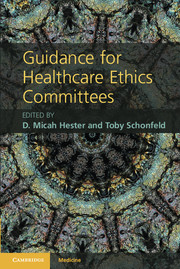Book contents
- Frontmatter
- Contents
- Contributors
- Preface
- Section 1 The Context of Healthcare Ethics Committee Work
- Section 2 Consultation
- 5 Mission, vision, goals: defining the parameters of ethics consultation
- 6 Ethics consultation process
- 7 Informed consent, shared decision-making, and the ethics committee
- 8 Decision-making capacity
- 9 Family dynamics and surrogate decision-making
- 10 Confidentiality
- 11 Advance care planning and end-of-life decision-making
- 12 Medical futility
- 13 Ethical issues in reproduction
- 14 Ethical issues in neonatology
- 15 Ethical issues in pediatrics
- Section 3 Policy Development and Organizational Issues
- Section 4 Educating Others
- Index
- References
6 - Ethics consultation process
Published online by Cambridge University Press: 05 August 2012
- Frontmatter
- Contents
- Contributors
- Preface
- Section 1 The Context of Healthcare Ethics Committee Work
- Section 2 Consultation
- 5 Mission, vision, goals: defining the parameters of ethics consultation
- 6 Ethics consultation process
- 7 Informed consent, shared decision-making, and the ethics committee
- 8 Decision-making capacity
- 9 Family dynamics and surrogate decision-making
- 10 Confidentiality
- 11 Advance care planning and end-of-life decision-making
- 12 Medical futility
- 13 Ethical issues in reproduction
- 14 Ethical issues in neonatology
- 15 Ethical issues in pediatrics
- Section 3 Policy Development and Organizational Issues
- Section 4 Educating Others
- Index
- References
Summary
Objectives
Outline the steps necessary for any ethics consultation to be considered adequate, fair, and complete. (mnemonic: “Gino’s Dice”)
Deine the three types of consulting models (individual, team, and committee) and compare their strengths and weaknesses.
Identify the skills and knowledge that diferent professions can bring to an ethics consult.
Case
Lisa Emory, 32, is having an uneventful first pregnancy. Lisa has discussed with her obstetrician, Dr. Stone, that she is a Jehovah’s Witness. For his part, Dr. Stone seem unfazed by the discussion, and he does not raise the issue again.
Consistent with these views, when Lisa is admitted to the hospital in labor, she tells her nurses that she would never want a transfusion, even if it would save her life. She has “the card” to prove it. When the nurse goes to document the discussion in the chart, however, she notices a note from Dr. Stone saying that he is aware that Ms. Emory is a practicing Jehovah’s Witness, but if she needs blood to save her life, he wants blood given.
In light of this note, the nurse asks for clarification from Dr. Stone, who says that his neonatal colleagues have given blood to a baby whose parents were Jehovah’s Witnesses, and he would do so for a mother because, as he puts it, “I won’t let a baby lose its mother. I’ve never lost a patient and I’m not about to start.” The nurse explains that the mother is an adult, not a child, but Dr. Stone simply thanks the nurse for her concern and walks away.
Troubled, the nurse calls her supervisor, who suggests getting an ethics committee consult.
- Type
- Chapter
- Information
- Guidance for Healthcare Ethics Committees , pp. 41 - 47Publisher: Cambridge University PressPrint publication year: 2012
References
- 4
- Cited by



